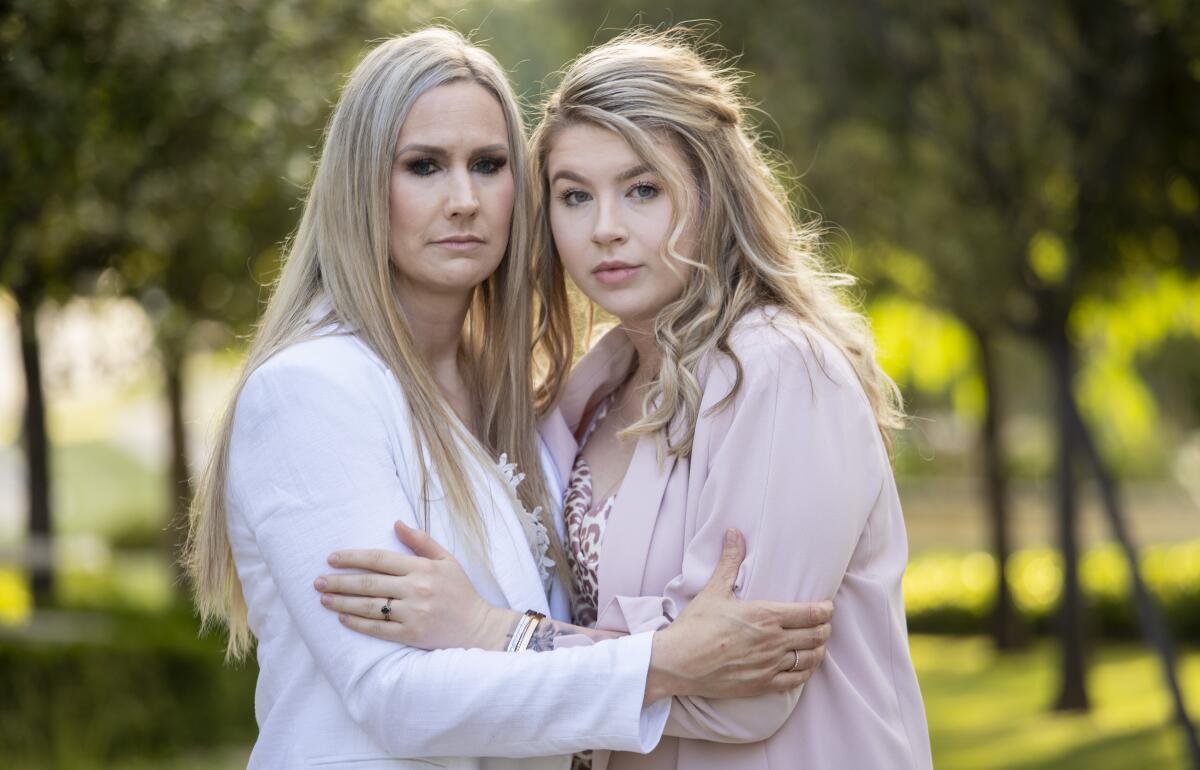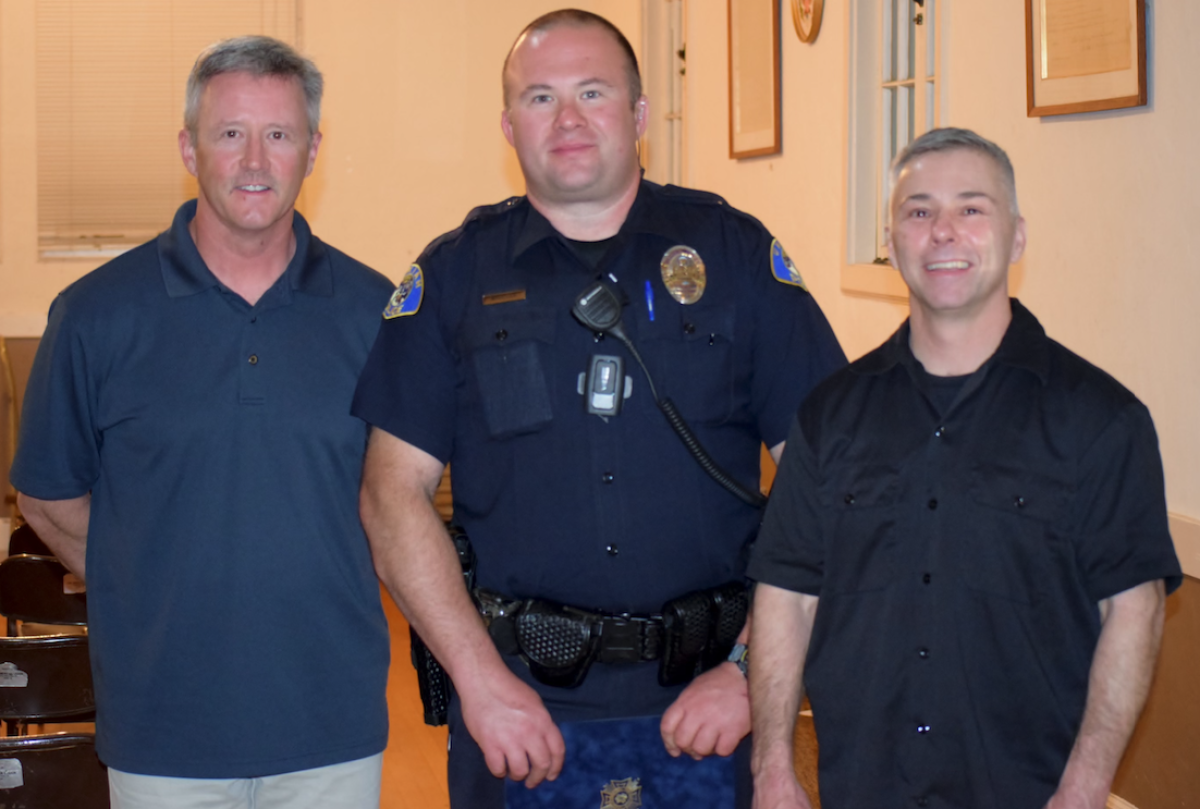A California police officer was accused of domestic violence. He still rose to be chief

- Share via
When Judge Jeanine B. Nadel calls her courtroom to order Friday morning, the benches will be filled with prominent local women.
They say they plan to show up at the Mendocino County Superior Court to support one of their own, a former county worker who sued the police chief — her onetime fiancé — alleging that he abused her.
The case stretches back more than a decade, a time during which Noble Waidelich rose through the ranks of the Ukiah Police Department, from patrol officer to detective to sergeant, lieutenant, captain and eventually chief.
Amanda Carley was there for one promotion and two of his officer-of-the-year commendations, a time when, she alleges, he smashed dishes on the floor in anger, slammed her against bookshelves and a refrigerator, swerved their car into oncoming traffic.
She packed her things and moved her children out of the house they owned together in 2015. She walked away from her job and sued her alleged abuser and the county in 2017. All the while, Waidelich continued to rise in the department.
On Friday, Nadel will decide whether Carley’s case can go to trial.
Waidelich did not respond to multiple requests for comment. His attorney, James King, declined to speak to The Times. In court documents, Waidelich denied all charges. Christian Curtis, Mendocino County counsel, said he could comment only on procedural matters regarding the case and declined to make further comments.
The case against Waidelich isn’t the first incident to plague the department. Just this year, the city paid hundreds of thousands of dollars to settle two lawsuits filed against its officers — one for use of force, another for sexual battery.
Carley and Waidelich met at the Mendocino County courthouse in 2009 when they were assigned to the same case — she was a victim’s witness advocate and he was a detective. Engaged within two months and joint homeowners within a year, Carley said she felt safe and secure.
But soon, she said, she found herself trying to leave him, one failed attempt after another.
“It started out as a shove and him standing in the doorway when I wanted to take a break. Then he was throwing me down on the table and swerving into oncoming traffic, threatening to drop me off in the middle of nowhere,” Carley said.
She did not hesitate to disclose the abuse to her friends and co-workers.
“I saw her at Schat’s Bakery right across from the courthouse, and she had a black eye, so I asked about it,” Megan Perez, Carley’s former close friend, recalled. After Carley said it was Waidelich’s doing, Perez said she told her friend, “At least you’re not protecting him and hiding it.”
Megan DiFranco, who shared an office with Carley when she worked at the district attorney’s office, said Carley once showed her the bruises.
“I remember being conflicted because we were mandated reporters, but according to them they were in therapy so I wasn’t sure if I should say something,” DiFranco said. She didn’t.
A concerned Ukiah police officer, Freddy Kepplinger, reported the abuse to the Police Department in 2013, prompting an internal investigation. At the time, Carley said she denied the allegations for fear he would hurt her two teenage children, Travis Sousa and Madisyn Carley, who were not his.
Two years later, Madisyn unwittingly blurted out to her middle school’s guidance counselor about the abuse she had witnessed. Another investigation was set in motion by county Child Protective Services.
“I was having such severe depression, and it was so draining to keep it bottled up inside me,” Madisyn said. “Our whole life was a facade, because in public we had to act like the perfect happy family.”
The disclosure triggered Child Protective Services to interview Madisyn and her mother, after which they determined a safety plan was necessary to keep Waidelich away from Madisyn. The agency notified the Mendocino County Sheriff’s Office, which launched a criminal investigation into the domestic violence allegations.
In a 47-page case report, sheriff’s Sgt. Andrew Porter wrote that he believed Amanda Carley was holding back and minimizing the incidents because of professional and financial concerns.
Carley took her children and moved out of the house within two weeks of the Child Protective Services intervention. Then, she reported Waidelich’s abuse to Porter in full detail.
The sheriff’s investigation continued, but Waidelich was not questioned. Findings were sent to Mendocino County Dist. Atty. C. David Eyster, along with evidence of the injuries Carley had endured throughout the years.
But Eyster declined to file criminal charges against Waidelich because, he wrote in his motion to strike Carley‘s cause of action, “the alleged victim is less than cooperative and presents as less than credible” and that some incidents were “too vague to prosecute.”
The county then opened another investigation — this one into Carley — for allegedly lying about whether she was abused.
At that point, Carley was working at the Probation Department as a deputy probation officer. Her supervisor immediately took her firearm away and reassigned her caseload.
She was interrogated and threatened with criminal charges by the county for withholding the truth. Waidelich was promoted to sergeant.
Taking away her gun seems partisan and premature, said George Kirkham, a criminologist at Florida State University and consultant to more than 50 law enforcement agencies. The investigation leading up to the disciplinary action appeared cherry-picked, he said.
“This was not an objective and thorough investigation in terms of basic elements of interviewing all parties, looking at all evidence physical or otherwise, then rendering an objective report,” Kirkham said. “The county had an obligation to take action, and it certainly would not involve promoting him.”
After the investigation concluded that Carley “did not fully disclose information about the domestic violence — that occurred — in her relationship with Waidelich on three occasions,” she was served with a written reprimand for “providing false or misleading information to a law enforcement officer.”
Judy Albert, program director at a Ukiah domestic violence crisis intervention organization called Project Sanctuary, said it is difficult for anyone to report domestic violence but especially difficult in Ukiah because it “feels very small” and “a lot of people know a lot of people.”
Ukiah is the county seat of Mendocino County with a population of about 16,000.

Waidelich, who was promoted to chief in October, is well-liked and seems more accessible than previous chiefs, Albert said. He is currently married with two daughters and a board member of the county’s youth project and homelessness committee.
Albert, who has worked at Ukiah’s Project Sanctuary for nearly 40 years, said she knows of approximately five officer-involved domestic violence reports made through the organization.
Victims of officer-involved domestic violence face unique challenges in reporting the abuse, studies show, given that police have knowledge of domestic violence shelter locations, possess lethal weapons and can leverage their position to protect themselves from legal consequences.
Carley filed a grievance challenging the reprimand and demanded a public hearing to refute the allegations. The county then withdrew the reprimand.
But she was never reissued her firearm, and she left her job in 2016. She later moved to San Bernardino County, where she filed the complaint.
Troyle Tognoli, a Black Lives Matter activist in Mendocino County who also created a public safety advisory board, said she will be in the courtroom Friday.
“This case is shaking our policing and legal community,” Tognoli said. “I want to make sure situations like this are not repeated.”
“Our law enforcement community is a small one,” she said. “When situations like this happen, it’s not that no one in the inside knows. Plenty of people know. It’s just that some couldn’t say anything out of fear or people turned a blind eye.”
In early June, the county offered to settle its part of the case for more than $100,000 in attorneys fees.
Carley declined.
“We’ve come this far,” she said, “and I’m not going to sacrifice my story and justice for money.”
More to Read
Sign up for Essential California
The most important California stories and recommendations in your inbox every morning.
You may occasionally receive promotional content from the Los Angeles Times.











